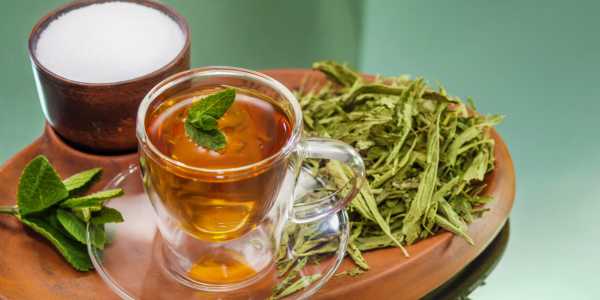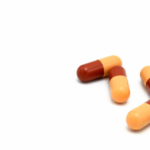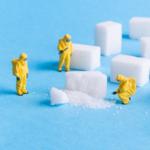
Stevia is a natural sweetener and sugar substitute derived from the leaves of the plant species Stevia Rebaudiana, a native to Brazil and Paraguay. It is now even grown in Japan and China. The active compounds in this product are steviol glycosides (mainly stevioside and rebaudioside), which have 30 to 150 times the sweetness of sugar. They are heat-stable, pH-stable and not fermentable. The body does not metabolize the glycosides in Stevia, which implies it contains zero calories like artificial sweeteners.
This non-nutritive sweetener and herbal supplement has thus been used to sweeten beverages since the 16th century and works out to be a far more healthy option than sugar. (1)
Fact-file on this natural sweetener (2, 3)
- Stevia tastes 200 to 300 times sweeter than table sugar.
- It can be classified as “zero-calorie” because the calories per serving are very low.
- It does not contain carbohydrates or any artificial ingredients.
- It has shown potential benefits as a healthy alternative for sugar, especially for people who have Diabetes.
- Several cola companies, especially in the U.S.A., nowadays sell diet cola soft drinks that are sweetened with Stevia.
- Some flavoured water companies also use Stevia.
- Stevia has been officially approved for use in countries like the United States of America and several others. It does not appear to pose any health hazards when used in moderation.
- It is usually sold (in powder or liquid form) in supermarkets and health-food stores.
- Stevia works as a perfect substitute for sugar in tea, coffee and other hot and cold drinks; cookie and cake recipes; and jams and jellies. It can be sprinkled on berries, fruit, and cereals at breakfast. Stevia can also be used in breads, although the bread won’t rise as much as it will if you use sugar. Using Stevia in drinks and recipes – anywhere you would typically use sugar – can help you avoid the health dangers of excess sugar and chemical sweeteners while allowing you to still enjoy your favourite sweet treats.
- It is associated with several impressive health benefits, such as reduced calorie intake, blood sugar levels and risk of cavities.
- Not having any calories helps this non-nutritive substance to promote weight loss.

Any health risks?
The U.S. Food & Drug Administration (FDA) has approved only the purified form of Stevia, called stevioside, as safe to use. Products considered safe contain words in their ingredient list such as “Stevia extract” or Stevia rebaudiana. Whole stevia leaves or crude stevia extracts should not be consumed since the FDA does not have enough information about their potential impact on our health, including kidney and cardiovascular problems. (3)
Side effects
Stevia can lead to a few side effects such as: (4)
- Can damage kidneys
It tends to increase the speed at which the body flushes out water and electrolyte in the form of urine. The primary role of the kidney is to create and filter urine thus, long-term consumption of Stevia may lead to kidney damage.
- Gastrointestinal symptoms
Some Stevia products have added sugar alcohol that can lead to common health problems like nausea, vomiting, bloating and cramping. Another Stevia side effect is indigestion and low metabolic rate.
- May result in Hypoglycemia
Hypoglycemia, commonly referred to as low blood sugar, can occur owing to increased consumption of Stevia.
- Low blood pressure
Since Stevia helps to reduce high blood pressure, it can also lower the BP when consumed regularly. People with chronic pressure problems should therefore consult their doctor before consuming this natural sweetener.
- Can lead to Endocrine-disruption
It can sometimes interfere with hormones that are controlled by the endocrine system.

Cooking with Stevia
Despite its side effects, Stevia lends itself well to cooking and baking, unlike some artificial and chemical sweeteners that break down at higher temperatures. Stevia is stable at temperatures of up to 392° Fahrenheit (200° Celsius), making it an ideal sugar substitute for many recipes. (5)

Quality meets affordability
For over three decades now, Shubham Pharmachem has achieved the best quality standards in the pharmaceutical industry. This leading merchant export organization has core competencies in the manufacturing and distribution of Active Pharmaceutical Ingredients (API), herbal extracts, nutraceutical ingredients, cosmetic ingredients and other life-saving medicines.
The constant endeavour of this dynamic organization is to develop novel scientific solutions through innovative products that are designed to improve the quality of life.
For more details, visit www.shubham.co.in
Disclaimer:
Shubham Pharmachem’s blog posts have been written with the information gathered from approved medical journals and websites online. Our research and technical team strive to provide relevant information through such articles. We strongly advise readers to not consume or administer any medication without prior consultation with their doctor.
References:
- Wikipedia [online]
Available at:
https://en.wikipedia.org/wiki/Stevia - MedicalNewsToday[online]
Available at:
https://www.medicalnewstoday.com/articles/287251 - WebMD [online]
Available at:
https://www.webmd.com/food-recipes/what-is-stevia - Wellcurve.in [online]
Available at:
https://www.wellcurve.in/blog/stevia-benefits-side-effects-uses-and-more/ - Stevia.org [online]
Available at:
https://www.stevia.org/stevia-recipes/cooking-with-stevia




